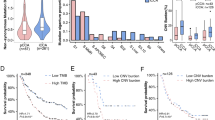Abstract
Objectives
WW domain-containing oxidoreductase (WWOX) is a tumor suppressor gene that maps to the common fragile site FRA16D on chromosome 16q23.3–24.1. To investigate the role of the WWOX gene in the development of extrahepatic cholangiocarcinoma (ECC), 30 tissue samples of ECC were examined.
Methods
Loss of heterozygosity (LOH), real time reverse transcription PCR (RT-PCR), and immunohistochemistry were used to assess the role of WWOX in cholangiocarcinoma.
Results
LOH was observed in 50% of cases, loss of mRNA was observed in 46.67% of the cases and loss of WWOX protein expression was found in 56.67% of ECC tissue samples. LOH, mRNA, and protein expression had a significant correlation with histological grading. The correlation coefficients were −0.623, −0.475 and −0.543, respectively. However, WWOX expression had no correlations with other clinicopathological factors such as age, gender, clinical staging or the status of preoperative hepatic function (p > 0.05). Poorly differentiated ECC had significantly lower expression of WWOX than that of moderately or well differentiated ones (p < 0.05).
Conclusions
Loss of WWOX may be involved in the tumorigenesis of extrahepati cholangiocarcinoma.



Similar content being viewed by others
References
Aqeilan RI, Kuroki T, Pekarsky Y et al (2004) Croce. Loss of WWOX expressin in gastric carcinoma. Clin Cancer Res 10:3053–3058. doi:10.1158/1078-0432.CCR-03-0594
Baffa R, Veronese ML, Santoro R et al (1998) Loss of FHIT expression in gastric carcinoma. Cancer Res 58:4708–4714
Bednarek AK, Laflin KJ, Daniel RL et al (2000) WWOX, a novel WW domain-containing protein mapping to human chromosome 16q23.3–24.1, a region frequently affected in breast cancer. Cancer Res 60:2140–2145
Bednarek AK, Keck CL, Daniel RL et al (2001) WWOX, the FRA16D gene, behaves as a suppressor of tumor growth. Cancer Res 61:8068–8073
Capuzzi D, Santoro E, Hauck WW et al (2000) Fhit expression in gastric adenocarcinoma: correlation with disease stage and survival. Cancer (Phila) 88:24–34
Driouch K, Prydz H, Monese R et al (2002) Alternative transcripts of the candidate tumor suppressor gene, WWOX, are expressed at high levels in human breast tumors. Oncogene 21:1832–1840
Huebner K, Croce CM (2001) FRA3B and other common fragile sites: the weakest links. Nat Rev Cancer 1:214–221. doi:10.1038/35106058
Kuroki T, Trapasso F, Shiraishi T et al (2002) Genetic alterations of the tumor suppressor gene WWOX in esophageal squamous cell carcinoma. Cancer Res 62:2258–2260
Kuroki T, Yendamuri S, Trapasso F et al (2004) The tumor suppressor gene WWOX at FRA16D is involved in pancreatic carcinogenesis. Clin Cancer Res 10:2459–2465. doi:10.1158/1078-0432.CCR-03-0096
Malhi H, Gores GJ (2006) Review article: the modern diagnosis and therapy of cholangiocarcinoma. Aliment Pharmacol Ther 23(9):1287–1296
Paige AJ, Taylor KJ, Taylor C et al (2001) WWOX: a candidate tumor suppressor gene involved in multiple tumor types. Proc Natl Acad Sci USA 98:11417–11422. doi:10.1073/pnas.191175898
Park SW, Luded-Meyers J, Zimonjic DB et al (2004) Frequent downregulation and loss of WWOX gene expression in human hepatocellular carcinoma. Br J Cancer 91:753–759
Ridruejo SR, Jimenez BB (2006) Infected cholangiocarcinoma. Med Interna 23(7):335–337
Ried K, Finnis M, Hobson L et al (2000) Common chromosomal fragile site FRA16D sequence: identification of the FOR gene spanning FRA16D and homozygous deletions and translocation breakpoints incancer cells. Hum Mol Genet 9:1651–1663
Yakicier MC, Legoix P, Vaury C et al (2001) Identification of homozygous deletions at chromosome 16q23 in aflatoxin B1 exposed hepatocellular carcinoma. Oncogene 20(37):5232–5238. doi:10.1038/sj.onc.1204674
Yendamuri S, Kuroki T, Trapasso F et al (2003) WW domain containing oxidoreductase gene expression is altered in non-small cell lung cancer. Cancer Res 63:878–881
Achnowledgments
This work was supported by Shanghai Natural Science Foundation.
Author information
Authors and Affiliations
Corresponding author
Rights and permissions
About this article
Cite this article
Wang, M., Gu, J., Wang, Y. et al. Loss of WWOX expression in human extrahepatic cholangiocarcinoma. J Cancer Res Clin Oncol 135, 39–44 (2009). https://doi.org/10.1007/s00432-008-0449-4
Received:
Accepted:
Published:
Issue Date:
DOI: https://doi.org/10.1007/s00432-008-0449-4




